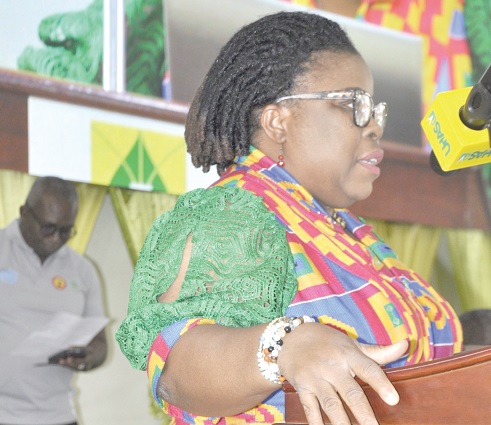The Vice Chancellor of the University of Health and Allied Sciences (UHAS), Professor Lydia Aziato, has said the university will continue to support traditional medicine practitioners by building their capacity through viable training programmes.
At the end of the training, the university will award the practitioners diplomas and other certificates for the programmes arranged for them on the campus.
This is to enhance their skills in herbal assessment, basic patient observations, and the interpretation of laboratory results, and to give them the recognition they deserve, she explained.
Professor Aziato was speaking at a closing and certificate-awarding ceremony for 272 traditional medicine practitioners from various parts of the country at the UHAS main campus at Sokode-Lokoe, near Ho.
The training was organised by the Institute of Traditional Medicine Practitioners Association (ITAM) in partnership with the Ghana Federation of Traditional Medicine Practitioners Association (GHAFTRAM).
The Vice- Chancellor said UHAS would also encourage capacity-building programmes for traditional medicine practitioners in local languages.
The just-ended training was held in Ewe, Twi and English.
The World Health Organisation (WHO) and Country Representative for Ghana, Dr Fiona Braka, commended ITAM and GHAFTRAM for their dedication to improving their members' skills in clinical practice, laboratory diagnostics, herbal product development and professional ethics.
“It demonstrates the growing professionalism and commitment within Ghana’s traditional medicine sector,” she added.
![]()
The traditional medicine practitioners
Dr Braka described the professional practice course as timely, saying that an estimated 60 to 70 per cent of the Ghanaian population relied on medicinal plants and traditional medicine for their healthcare needs.
That, she said, testified to the deep roots of traditional medicine in the culture and identity of the people.
Touching on challenges facing the sector, Dr Braka said the recent revelation by the Traditional Medicine Practice Council that more than 521,000 traditional and alternative practitioners were operating without proper registration or licenses was disturbing.
She said it highlighted the need for structural training, proper regulation and better integration into the formal healthcare system.
Dr Braka urged ITAM and GHAFTRAM to continue to expand the training programme to benefit more traditional medicine practitioners in the country and beyond.
“You must also strengthen partnerships with academic institutions to document the impact of traditional medicine on health outcomes and contribute to global knowledge,” she added.
In a speech read on his behalf, the Minister of Health, Kwabena Mintah Akandoh, said the Ministry of Health recognised the important role of traditional medicine in the country’s healthcare sector.
He said for centuries, it has brought relief to the sick, especially in rural communities.
Therefore, Mr Akando said the ministry would definitely support traditional medicine practitioners' capacity-building programmes in various ways to enable them to make the desired impact on healthcare delivery.

